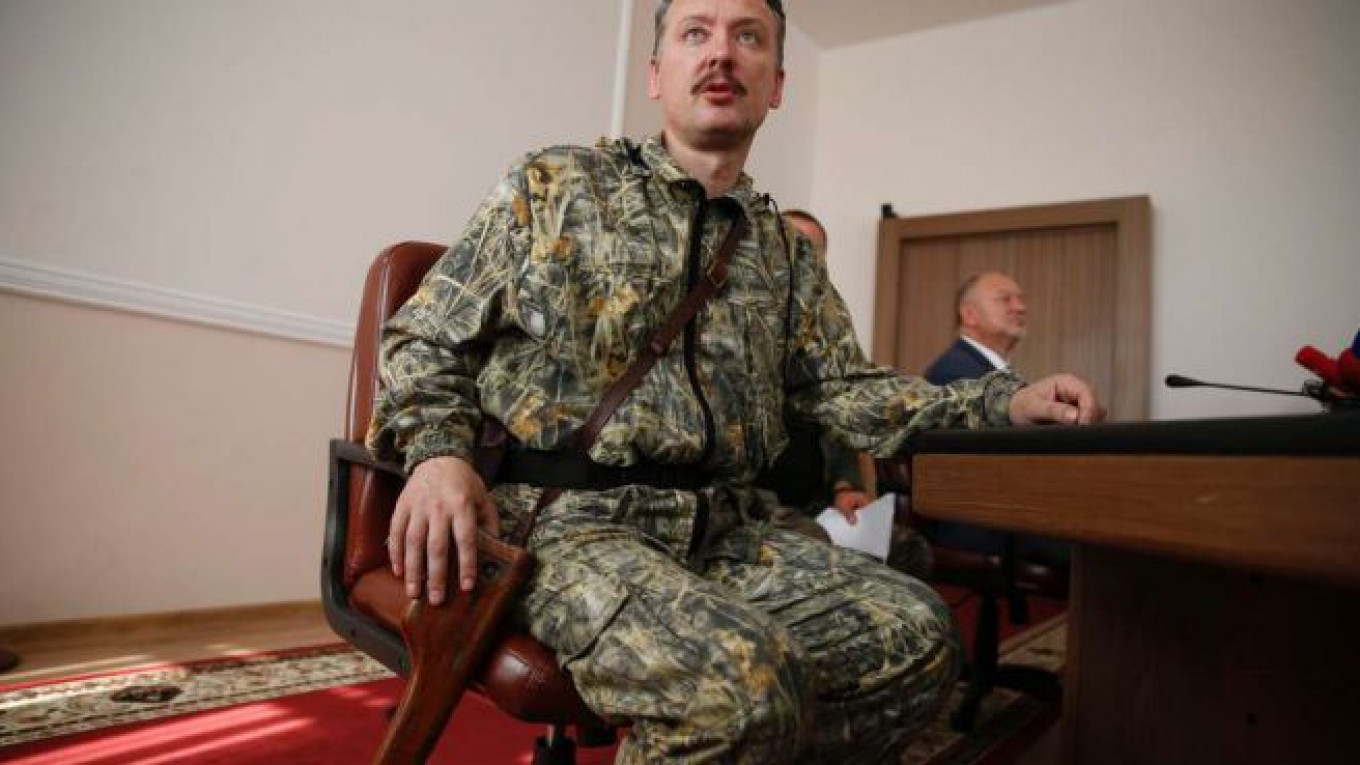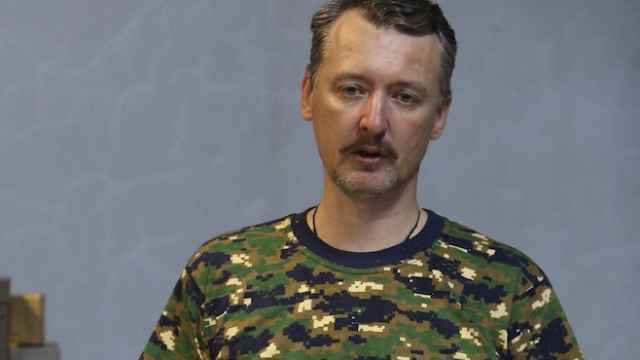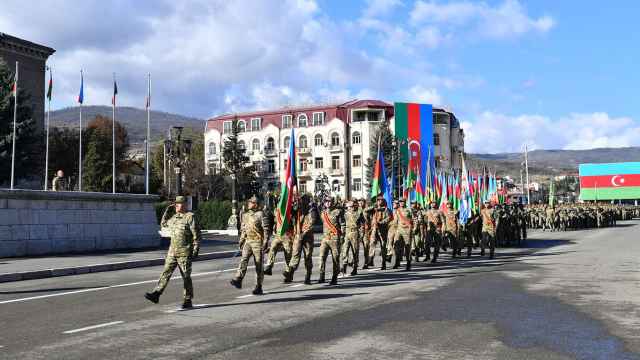By Lucian Kim
The official Kremlin narrative on the war in eastern Ukraine is clear and simple: after seizing power in February, a Western-backed "junta" in Kiev sent neo-Nazi gangs — then tanks and warplanes — to stamp out peaceful protests by the Russian-speaking community. The locals who took up arms are freedom fighters, and the only help they get from Russia is humanitarian aid. For the past six months, Russian state television has carpet-bombed its viewers with this message, day in and day out.
Now one of the leaders of the rebellion in eastern Ukraine has turned the Kremlin storyline on its head. Igor Girkin, a retired Russian special ops officer also known as Igor Strelkov or simply "Strelok" (Shooter,) was the military commander of the self-proclaimed Donetsk People's Republic before getting abruptly recalled to Russia. In an interview published last week in the Russian ultranationalist weekly Zavtra, Girkin details how he helped instigate the insurrection and active-duty Russian soldiers later intervened to save the rebels from the jaws of defeat.
Girkin is a loose cannon. He views himself as a warrior in a bigger war against a godless West that has lost its Christian roots and thirsts for Russia's resources to feed its decadent ways. Girkin prides himself on his service to the greater Russian cause and has no reason to toe the Kremlin line. Hardcore Russian nationalists already consider him a worthy alternative to President Vladimir Putin.
For Girkin, there is no question of who started the conflict; he claims to have started it himself. "I'm the one who pulled the trigger of war. If our squad hadn't crossed the border, it all would have ended like in Kharkiv or Odessa. There would have been a few dozen killed, burned, and arrested. And that would have ended everything," Girkin says. "Our squad set the flywheel of war in motion. We reshuffled all the cards on the table."
When Girkin and his men took over the town of Slovyansk on Apr. 12, cities in eastern and southern Ukraine had been experiencing weeks of protests by demonstrators waving Russian flags and demanding a referendum on autonomy. The protesters called their rallies "anti-Maidan" — an answer to the pro-European demonstration in Kiev that swept then-President Viktor Yanukovych from power. Having just lost Crimea to Russia without a fight, the provisional government in Kiev was confused and unresponsive. Meeting almost no resistance, pro-Russian protesters stormed the regional administration in Donetsk and proclaimed a "People's Republic." Less than a week later, Girkin led the takeover of a string of towns north of Donetsk.
"I take personal responsibility for what's going on. I take responsibility for the continued shelling of Donetsk," Girkin says. More than 4,300 people have been killed in fighting in the Donetsk and Luhansk regions since April and almost 1 million displaced from their homes, the United Nations said last week.
What the Kremlin tries to hide with fabrications and lies, Girkin says openly. The mustachioed, gray-haired 43-year-old, who used to appear in photographs in fatigues but now presents himself in a suit and tie, sees no shame in what he's done. On the contrary, for Russian nationalists like Girkin, Kiev's post-revolutionary paralysis presented a unique opportunity to restore Novorossiya — a czarist-era designation for much of present-day Ukraine. Girkin doesn't use the vocabulary of Putin's propaganda machine to describe Ukrainians ("fascists," "punishers") but speaks in the dispassionate voice of a military man when recalling key moments.
Little is known about Girkin, who says in the interview that he tried to remain in the shadows as long as possible. What he does reveal is that Ukraine was his fifth conflict, after the two Russian campaigns in Chechnya, the fighting for the pro-Moscow enclave of Transdnestr in Moldova, and the Bosnian war, where he fought on the Bosnian Serb side. In his own words, Girkin is a former colonel in the Russian special forces.
The interview in Zavtra isn't a Q&A in the classic journalistic sense, since the interviewer, editor Alexander Prokhanov, can barely contain his admiration for Girkin. "I believe you did everything right," Prokhanov says. "Everything you did was a messianic feat." Follow-up questions such as "Who gave you orders?" or "Where do the borders of Novorossiya end?" are missing. Zavtra is the ideological home for ultranationalists who miss Russia as a great power, whether it was called the Russian Empire or Soviet Union. Alexander Borodai, a Russian citizen who served as the Donetsk rebels' prime minister, has also contributed to the publication.
Girkin's involvement in Ukraine started in Crimea, which Russia annexed in the power vacuum following Yanukovych's downfall. Girkin calls the Crimean peninsula, home to the Russia's Black Sea Fleet for more than 200 years, "the jewel in the crown of the Russian Empire." In his capacity as an adviser to Sergei Aksyonov, head of Moscow's puppet government there, Girkin met with delegates from the Ukrainian mainland who wanted to follow Crimea into the Russian Federation. He assembled 52 volunteer fighters and in April headed for Slovyansk, which was chosen because local support for the uprising was deemed to be highest there.
In Slovyansk, Girkin says he was joined by no more than 200 local men who helped storm the police station. From there, he sent 30 Cossacks to take the neighboring town of Kramatorsk. By the end of May, the Donetsk rebels had 28,000 local volunteers, and even if half of them were criminals or random characters, the rest were ready to fight, according to Girkin. The main problem was that there weren't enough weapons.
Girkin debunks two Kremlin myths, namely that demonstrators in Donetsk had any intention of seeking the "federalization" of Ukraine in a May 11 referendum and that Kiev sent in the army to persecute Russian speakers.
"Nobody was ready to come out for the Luhansk or Donetsk republics. Everybody was for Russia from the start. The referendum was held for Russia and they came to fight for Russia," says Girkin. "Later, when I understood that Russia wouldn't take us, that decision came as a shock."
As for the Ukrainian forces that began timidly moving on Slovyansk, Girkin says they were "extremely cautious" as they didn't know how Russia would respond. The shooting didn't begin until activists from Right Sector, a nationalist Ukrainian group that participated on the Maidan, tried to infiltrate his lines, according to Girkin. The Ukrainians then stepped up their attacks on Slovyansk as they became more confident Russia wouldn't intervene directly.
Girkin maintains that of his 1,000 fighters holed up in Slovyansk, 90 percent were locals. By early July, their situation became increasingly precarious as Ukrainian government forces encircled the town. With only two working tanks and six armored vehicles, Girkin decided to cut his losses by abandoning Slovyansk and relocating to Donetsk on July 5.
Donetsk, an industrial city of 1 million, was still a city at peace, with weak defenses and half of the government still taking orders from Kiev, Girkin recalls. "People were sunbathing and went swimming; athletes worked out; people were drinking coffee in the cafes. Donetsk was just like Moscow in the summer," he says. The separatist leadership was splintered and disorganized, but Girkin says he concentrated on organizing the city's defenses rather than risk "civil war" among the rebels. Girkin describes his "psychological crisis" when the Ukrainians cut off his supply route to Russia. "To be honest, at one point I stopped believing that any help would come from Russia," he says.
But then help did arrive in the form of soldiers from the regular Russian army. Girkin and Prokhanov euphemistically call them otpuskniki (soldiers on leave), in reference to rebel leader Alexander Zakharchenko's admission on Russian state television in late August that up to 4,000 Russian soldiers preferred to spend their leave fighting in Ukraine than "on the beach." The Russian intervention halted the Ukrainian offensive and forced President Petro Poroshenko to agree to a cease-fire on Sept. 5.
Girkin's conversation with Prokhanov raises some intriguing questions. It's completely unclear who Girkin's superiors were, though they were clearly not the rebels. "I had the explicit order: don't give up Slovyansk," he remembers. Girkin was told to defend the town "to the end," he says, but when he asked what kind of help he'd be getting, there was silence.
Also, Girkin claims that the Ukrainian port city of Mariupol was empty when the Russian otpuskniki reached it and could have been taken without a fight. "There was the order not to occupy it — not just an order to stop, but not to take it under any circumstances," Girkin says. Again the source of the order goes unmentioned. And if Girkin is right that the pro-Moscow forces were ordered not to take one of the most strategic cities in the Donetsk region, it raises the question why.
At this point in the fighting, Girkin himself was no longer military commander of the Donetsk rebels, as he was recalled to Russia on Aug. 14 under murky circumstances. Why? And by whom? Based on Girkin's comments, it appears the Kremlin is not only opposed to annexing the Donetsk and Luhansk regions but wants to prevent them from becoming too powerful. As dysfunctional gangster states inside Ukraine's borders, they provide Moscow with the greatest possible leverage over Kiev.
Girkin has been careful not to criticize Putin, even though in an earlier interview he blamed traitors in the government — including Kremlin insider Vladislav Surkov — for the precarious state of the Novorossiya project. Girkin complains to Prokhanov that Russia continues to sell natural gas to Ukraine while the Ukrainian army shells Donetsk.
For the moment, Girkin has been put in his place, because even though he expresses the desire to return to Donetsk, he now has to satisfy himself with organizing aid for his comrades at the front. Since his identity is now known, Girkin says he can't live in his Moscow apartment and misses his personal library. About a month ago he started his own website, igorstrelkov.ru, to reach out to his growing fan base.
Girkin is representative of an ultranationalist fringe whose anti-Western, Russian Orthodox ideology is gaining in currency. While Putin has tapped into Russian nationalism out of opportunism, his ultimate goal is not the resurrection of the Soviet Union but his own political survival. When tens of thousands of Muscovites took to the streets to protest against Putin three years ago, ultranationalists marched in their midst. The Ukraine conflict has only empowered them.
In the Zavtra interview, Prokhanov repeatedly tries to get Girkin to show some interest in politics, but he doesn't go for the bait.
"There isn't anything for an honest person to do in politics. I hope that changes. After all, war changes a lot of things," Girkin says ominously. "Politics right now is the manipulation of elections, lying on television, lying everywhere. The main quality of a politician is to twirl like a weathervane."
Girkin says that he sees himself as a "secret services man" above all. Prokhanov replies that "as a secret services man, you have the chance to become a great politician."
Putin, after all, also rose out of the secret services.
A Message from The Moscow Times:
Dear readers,
We are facing unprecedented challenges. Russia's Prosecutor General's Office has designated The Moscow Times as an "undesirable" organization, criminalizing our work and putting our staff at risk of prosecution. This follows our earlier unjust labeling as a "foreign agent."
These actions are direct attempts to silence independent journalism in Russia. The authorities claim our work "discredits the decisions of the Russian leadership." We see things differently: we strive to provide accurate, unbiased reporting on Russia.
We, the journalists of The Moscow Times, refuse to be silenced. But to continue our work, we need your help.
Your support, no matter how small, makes a world of difference. If you can, please support us monthly starting from just $2. It's quick to set up, and every contribution makes a significant impact.
By supporting The Moscow Times, you're defending open, independent journalism in the face of repression. Thank you for standing with us.
Remind me later.






